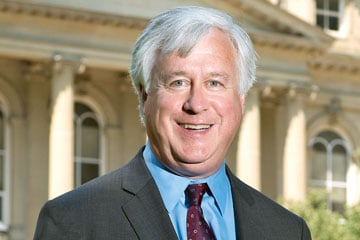
The Law Society of Ontario is now better prepared to step up in engaging with Legal Aid Ontario, after years of distance between the two organizations, says outgoing treasurer Paul Schabas. Schabas — who on June 28 leaves the role of treasurer of the regulatory body — says that a deeper relationship with Legal Aid Ontario is one of the most enduring things he accomplished in the role.

The Law Society of Ontario is now better prepared to step up in engaging with Legal Aid Ontario, after years of distance between the two organizations, says outgoing treasurer Paul Schabas. Schabas — who on June 28 leaves the role of treasurer of the regulatory body — says that a deeper relationship with Legal Aid Ontario is one of the most enduring things he accomplished in the role.
A law society working group found in January that LAO needed to “increase its accountability to stakeholders.”
The working group’s recommendations included that the LSO encourage firms to collect disaggregated demographic data to ensure greater transparency in legal aid and that board nominees meet certain minimums of experience. The law society will also hold public symposia on legal aid issues to gather the opinions of experts.
“That, I think, is a long-term and lasting achievement for us,” says Schabas.
“This is something you can come to my successor [with] — or my successor five or 10 years down the road. If you’re concerned about legal aid, come to the law society and say, ‘You have a role in this, too.’ Because we do. And I think it’s really important that we step up.”
The working group’s report also noted that meaningful opportunities to contribute had “eroded over the past decade” and said LAO was perceived by onlookers to be a “culture of secrecy” that lacked meaningful connections with the law profession.
As treasurer, Schabas presided over a period of tremendous change for the centuries-old law society. He has shepherded the LSO through some high-profile shifts: a name change, a debate over licensing and the adoption of a Statement of Principles that drew ire from some members.
Among the shifts that happened, Schabas says, one of his most “under the radar” accomplishments was forging a relationship with legal aid. While legal aid was the LSO’s dominion from the 1960s, a 1998 act established Legal Aid Ontario as its own, independent organization, giving the law society influence through the board of directors.
“We really disengaged from it,” Schabas says.
He says many lawyers recognized that the stakes between the two organizations were higher than that. Now, he says, there is a clearer path ahead.
“We can provide more input, provide more support and, sometimes, where it’s warranted, we can provide more criticism of what’s happening in legal aid,” Schabas says. “The idea is to be a constructive voice, to remind everybody of the importance of having a good, robust legal aid plan — and make sure there is a good and robust legal aid plan.”
Schabas says the law society is also encouraging lawyers to support the unbundling of legal services. A major argument in favour of the unbundling or limited-scope retainers — which Schabas supports — is that clients can pick and choose the services they can afford.
The law society’s creation of a new family law licence for paralegals also provides an alternative, often more affordable route for Ontarians to access legal services, Schabas says.
For Schabas, the emphasis on access to justice is just one way that the LSO is transforming.
“It’s not easy for an old, storied, one might say conservative organization that’s used to being a regulator to recognize that being a regulator in the public interest means that we have to be more proactive,” Schabas says. “What I hope I’ve accomplished is made people more comfortable with the need to be proactive and to be transparent and to be, frankly, progressive.”
For example, the recent name change — to the Law Society of Ontario from the Law Society of Upper Canada — was a reversal of hundreds of years of tradition.
But he says the name served as a symbol that the society was open to change — and necessary to maintain relevance.
The adoption of the Statement of Principles — which requires lawyers to acknowledge “obligation to promote equality, diversity and inclusion generally” and professionally — also drew backlash.
He says much of the pushback around both changes in the law society was a result of “a lot of debate” but “very little dissent.”
Schabas says the law society has other challenges ahead. He says there are ongoing debates about licensure and governance and the continuing duty to address disparities in gender, race and Indigenous status within the law profession.
“We can’t just sit and say, ‘Don’t worry, discrimination will take care of itself,” Schabas says.
As the law society changes its views on topics such as technology and mental health, Schabas says, he hopes the law society takes a leading role, too. He declined to make an endorsement for his successor, but Schabas says he does have a piece of advice for the new treasurer.
“Enjoy it and press on. Press on in meeting the challenges that the society has for us as a profession,” he says.